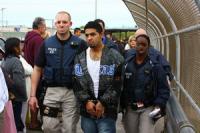-
Polarization versus Democracy
When can we realistically expect ordinary people to check the authoritarian ambitions of elected politicians? An answer to this question is key to understanding the most prominent development in the dynamic of democratic survival since the end of the Cold War: the subversion of democracy by elected incumbents and its emergence as the most common form of democratic breakdown.
-
-
Federal Judge Blocks Trump’s Restrictions on Asylum at U.S.-Mexico Border
A U.S. federal judge has blocked the Trump administration from enforcing a directive which disqualifies a significant proportion of mostly Central American asylum-seekers who reach the U.S.-Mexico border. In his ruling Wednesday, Judge Jon Tigar of the U.S. District Court for the Northern District of California cited multiple concerns about the rule and the way it was issued. Hours before Tigar issued his ruling, a district court judge in Washington, D.C., denied a similar request to block the rule in a separate case.
-
-
A Framework for a Fair, Humane, and Workable Immigration Policy
The immigration debate in America today is nearly as broken as the country’s immigration system itself. The other day, the Center for American Progress released a new report which provides a framework to fix both. CAP notes that for many years, conversations about immigration have been predicated on a false choice that says America can either honor its identity as a nation of immigrants or live up to its ideals as a nation of laws by enforcing the current broken immigration system. Tom Jawetz, the report’s author, argues that by accepting these terms of the debate, supporters of sensible immigration policy have ceded powerful rhetorical ground to immigration restrictionists.
-
-
Criminal Prosecutions and Illegal Entry: A Deeper Dive
Since the first Democratic presidential debates at the end of June, candidates, pundits and former government officials have discussed whether provisions of law that turn unauthorized border crossing into the federal crime of “improper entry” – in addition to a civil immigration law violation – should be repealed. Over the last three years, researchers at Human Rights First have conducted extensive research and observed countless entry and re-entry prosecutions in Arizona, California, New Mexico and Texas. These prosecutions, as we have detailed in a series of reports, violate U.S. refugee treaty obligations, impinge on due process, separate children from their parents, waste government funds, and divert prosecutorial resources from serious criminal and security threats.
-
-
German law would require measles vaccination to attend schools, kindergartens, daycare
German children will have to prove they have had a measles vaccination before they would be allowed to attend kindergarten or go to school. A new draft law imposes steep fines on parents who refuse to immunize their children.
-
-
U.S. Offensive Cyber Operations against Economic Cyber Intrusions: An International Law Analysis
The United States is likely to struggle to make a convincing argument that economic cyber intrusions carried out against it breach international law. Consequently, in most cases the United States would not be able to resort to countermeasures in response. It must therefore show that its offensive cyber operations do not themselves breach international law.
-
-
“Safe Third Country” Agreements with Mexico and Guatemala Would Be Unlawful
News reports that the United States seeks to sign “Safe Third Country” agreements with Mexico and Guatemala – possibly as soon as today – mark the latest phase in the Trump Administration’s efforts to keep Central American asylum seekers from reaching the country. Such agreements would bar asylum applications in the United States from thousands fleeing El Salvador and Honduras, as well as claimants from other world regions who transit Central America and Mexico to reach our border. And they would be contrary to both U.S. and international law on the protection of asylum seekers.
-
-
Mexicans in U.S. Routinely Confront Legal Abuse, Racial Profiling, ICE Targeting and Other Civil Rights Violations

Officially, the Constitution of the United States gives everyone on U.S. soil equal protection under the law – regardless of nationality or legal status. But, as recent stories of the neglectful treatment of migrant children in government detention centers demonstrate, these civil rights are not always granted to immigrants.
-
-
Truth prevails: Sandy Hook father’s victory over conspiracy theory crackpots
Noah Pozner, then 6-year old, was the youngest of twenty children and staff killed at Sandy Hook Elementary School in Connecticut. Last week, his father, Lenny Pozner, won an important court victory against conspiracy theorists who claimed the massacre had been staged by the Obama administration to promote gun control measures. The crackpots who wrote a book advancing this preposterous theory also claimed that Pozner had faked his son’s death certificate as part of this plot.
-
-
Ahead of the 2020 election: National response to confront foreign interference
Stanford University scholars outline a detailed strategy for how to protect the integrity of American elections – including recommendations such as requiring a paper trail of every vote cast and publishing information about a campaign’s connections with foreign nationals.
-
-
Scam contractors preying on victims of natural disasters
Following a natural disaster or strong storm like Hurricane Florence, there is usually a second wave of potential destruction – scam artists looking to line their pockets. “After any major weather-related incident, insurance adjusters and contractors swarm the affected area and, unfortunately, some are looking to take advantage of those in distress,” says one expert.
-
-
U.K. equality watchdog launches formal investigation into Labour Party over anti-Semitism claims

The Equality and Human Rights Commission (EHRC) announced Tuesday a full statutory investigation against the British Labour Party over its failure to stamp out anti-Semitism in its ranks and to investigate if the party had “unlawfully discriminated” against people because they are Jewish.
-
-
Assange’s new indictment: Espionage and the First Amendment
The Espionage Act, a sweeping federal statute enacted a century ago, imposes heavy criminal penalties for obtaining or disclosing classified information without proper authorization. Beginning under President Barack Obama, recent years saw a dramatic increase in prosecutions under the Espionage Act. But these prosecutions were directed at leakers of classified information — all government employees and government contractors — not at journalists or publishers. That makes Assange’s indictment a watershed.
-
-
Ghost guns are everywhere in California

Feds say nearly a third of firearms recovered in California are homemade, unserialized, and untraceable. Experts say the accessibility of ghost guns is aided by a cottage industry of retailers selling nearly completed firearms that require no screening to purchase.
-
-
Eric Oliver on the science of conspiracy theories and political polarization
The “birthers,” “Pizzagate,” anti-vaxxers. It seems that belief in conspiracy theories is on the rise. At the same time, our polarization is worse than ever. People can hardly even maintain a conversation across political or cultural lines. Could the underlying force driving conspiracy theories also be the same one that’s dividing our country?
-
More headlines
The long view
The Center Can Hold — States’ Rights and Local Privilege in a Climate of Federal Overreach
As American institutions weather the storms of executive disruption, legal ambiguity, and polarized governance, we must reexamine what it means for “the center” to hold.
How to Reverse Nation’s Declining Birth Rate
Health experts urge policies that buoy families: lower living costs, affordable childcare, help for older parents who want more kids
Turnover Among Election Officials Reaches New High: Report
Election officials turned over at the highest rate in at least a quarter century during the last presidential election. Nearly 40 percent of election officials administering the 2024 election weren’t around in 2020.
Voting from Your Sofa Is Secure Enough – but Will It Be Allowed?
A new electronic voting system developed at NTNU can withstand attacks from quantum computers, meaning digital elections can be conducted securely, even in the future.
